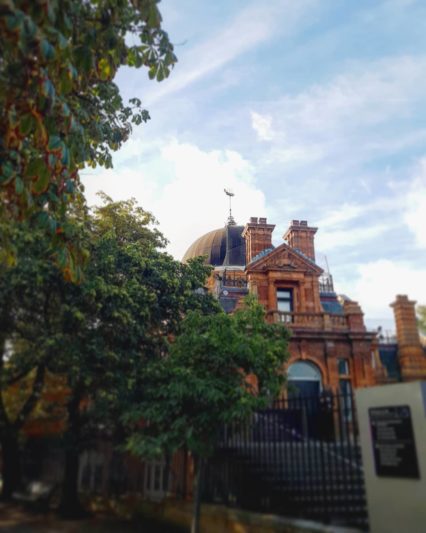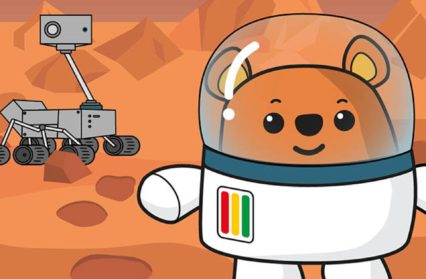David Roche explores his new role as composer for a new project at the Royal Observatory in Greenwich.
Once I’d found out that I’d be writing the music for Ted’s Space Adventure, a planetarium show created by the Royal Observatory Greenwich, I decided that it was a good excuse to get back in to driving. I had passed my test (first time mind you – brag) and then hadn’t driven for 10 years. I knew that I’d have to travel from Cambridge in England to Tredegar in Wales a few times to do some studio work on the project, I (gratefully) had access to a car, and I had a few days free to learn again. The whole thing was a real Wacky Races affair but, two punctured tyres and many cold sweats later, I can safely say that I’m road ready – look out world! So, before I begin properly, I’d like to remind people of the obvious truth that you can’t hurry the process of learning to drive… or perhaps that it is worth driving if you’re going to work with the right people. Operating a car constituted such a small part of this project, however, and it is my hope that this blog will give not just give you insight in to the process of driving a car after a long while but also the process of completing a large compositional project to set of specific stipulations.
 One of the first things I received for this project, aside from a brief, was a fishbowl-shaped video. It’s worth remembering that the goal was to create a planetarium show, so the video had to be set up to project appropriately on the ceiling of an observatory. It was a bit unusual at first but it was fun to be reminded of where it was going to be used. Once I’d opened this in to my sequencer (Logic X), I spent a lot of time noodling along to the video with MIDI keyboards, guitars, tin whistles, and pianos. My primary goal was to create a 42 second chorus which would be used to reinforce some of the ideas that the Royal Observatory Greenwich wanted the anticipated audience to learn. So, it needed to be catchy, memorable, contain specific information, and also be roughy 42 seconds – owing to the cut in the video.
One of the first things I received for this project, aside from a brief, was a fishbowl-shaped video. It’s worth remembering that the goal was to create a planetarium show, so the video had to be set up to project appropriately on the ceiling of an observatory. It was a bit unusual at first but it was fun to be reminded of where it was going to be used. Once I’d opened this in to my sequencer (Logic X), I spent a lot of time noodling along to the video with MIDI keyboards, guitars, tin whistles, and pianos. My primary goal was to create a 42 second chorus which would be used to reinforce some of the ideas that the Royal Observatory Greenwich wanted the anticipated audience to learn. So, it needed to be catchy, memorable, contain specific information, and also be roughy 42 seconds – owing to the cut in the video.
At the time I was working 3 days a week as a composer and 2 days a week in a bookshop (it was actually my last month in the bookshop full-time, I was working my notice). The bookshop also sold ukuleles and, occasionally, I’d have an opportunity to ‘maintain’ the ukuleles and guitars and, of course, I’d end up just playing them. Over the course of the 5 years I worked there this proved to be a ridiculously fruitful way of writing and reflecting on music. I wrote a load of pieces there including Uncle Dave’s Jigg (which won 2 prizes – listen below), a tremolo study for classical guitar that I developed in to an aria for my third opera, a piece for the BBC National Orchestra of Wales, and a riff that became the piece that I initially tried to use for Ted’s Space Adventure.
I came up with a little song at the till in the basement of the shop and later that day when I was moved to the till at the front of the shop I wrote the lyrics, penning them on a receipt to remember them. In the evening I grabbed my guitar and recorded a rough demo track of the song with my partner. You can hear us both on the track although neither of us profess to be professional singers… yet (hashtag: toptenhit).
One of the main stipulations was to keep it as simple as possible. My first draft was a little overboard (although I still absolutely love it). So, once I was accepted to work on the project fully, I wrote three small, simpler pieces and submitted two of them to see which the Royal Observatory Greenwich found most appropriate. These were much slower, gentler, and more spacious. Once they’d selected the piece of music they preferred I developed the rest of the material for the film. Each segment of the show is based on a planet that our protagonist Ted visits, and each segment of the music is developed from musical ideas in the chorus. So even when Ted is relentlessly exploring, the audience will hopefully have a bit of musical unity and anchoring. Here’s a sample clip:
The biggest challenge for me, aside from creating the initial ‘good’ idea, was ensuring that the drafts met the expectations of the Royal Observatory Greenwich. They stated that they’d like a choir of children singing the chorus, that the names of the planets need to be there, and that it needed to be suitable for an audience of people aged 7 and under. The best way for everyone to be happy in a situation like this is to create lots of drafts, get lots of feedback, and make lots of amendments. This was definitely part of the process throughout the creation of Ted’s Space Adventure and for me it felt like a sleek, fruitful process. It’s rare to have the chance to discuss a piece of work but planning to do so definitely leads to results that satisfy the expectations and requirements of a greater proportion of those involved.
The process of completing the draft of the piece was much faster than coming up with the initial idea. For each new section I would develop a small aspect of the chorus. I plonked myself in my chair with my MIDI keyboard and tapped away, section by section, until the whole 20 minutes was covered. This process took about 10 days. 3 to create a very rough draft, 3 to look over it and mix it to the best of my ability, then 4 more (after a break for feedback) to make any changes before I popped it in the studio to create a full, completely edited version.
The studio I worked at was Unit 13 Studios. It’s partly owned by my very old friend / extraordinary studio engineer Aled Davies and his equally excellent colleague Samuel Kilby. Using their sample libraries and studio equipment, we went through the whole piece, crafted it, and ironed out all of the tiny creases, replaced all the samples for higher quality ones, and mixed the piece. The turnaround for this project was very quick so it required a lot of dedicated focus and commitment to ensure that the work was completed to the highest possible standard. I often find this is particularly difficult with projects that are long but not necessarily complex – it takes a long time to edit music and if you rush it or lose concentration then something will slip through the gaps. It is easy to lose focus when the work isn’t too technically demanding, especially when there’s lots of it. Following on from this process the only thing left to do was add the singing. I rented a series of microphones and I went to complete the recording back in Cambridge.
Sometime in summer 2016 I was sitting in a renovated barn in Cornwall, doing some work as part of a residency (track posted after this paragraph). Phone signal was pretty dodgy – this was great, it was good to get away – but I managed to receive a call from a school local to where I live in Cambridge asking if I’d like to work with their guitar and ukulele orchestra. Which I absolutely did (and still do – just started my 4th term). When I was looking for a choir for Ted’s Space Adventure these were the first people to come to mind. I got in touch with the departmental heads and teachers at the school and asked if it would be possible to hire them to record some singing. Once all of the permissions and payments were confirmed I went in for a recording session. All of the choir members were super professional, especially in the face of being made to sing the same song 30 times (!). That’s on top of learning it and shouting all the additional bits and bobs that made the final piece so great! It was also extremely reassuring to see and hear a large group of young people really enjoy the music. Lots of people wanted to add extra shouts, do extra takes, asked questions about the process of recording, and were positive, curious, and engaged the whole way through. It was a lot of fun and, once completed, the most suitable takes were added to the audio and the final mix was made. The true final step was exporting the files in the appropriate formats which, for a project this large, took a huge amount of time. Not necessarily taxing but worth giving yourself a bit of extra time to do.
The whole process took about 8-9 months and, for me, everything felt extremely complete at the end: a rare and excellent state to find oneself in. I would absolutely advocate taking the time to collaborate, feedback, and test the music that you’re writing or the project that you’re working on. For me the difference in end result between a project where you can plan feedback and further work in response to feedback and a project where you cannot is phenomenal. It’s also worth adding that there was a second period of revisions after the show had been tested (although these were very, very slight – which was great!). In projects like this I think it’s important for everyone to be happy at the end, it’s important to be critical, and it’s important to work with people who you know will achieve the result you want.
So, If you’ve got children aged 7 or under or you just want to learn a whole load about space then please go and see Ted’s Space Adventure at the Royal Observatory Greenwich. It’s awesome!












